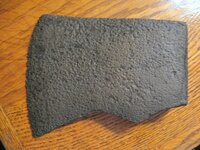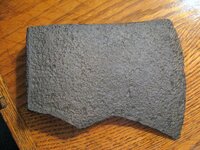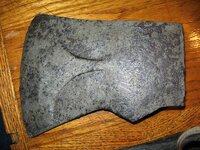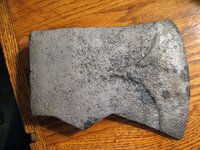Valley Ranger
Silver Member
- Mar 24, 2011
- 2,515
- 1,368
- 🏆 Honorable Mentions:
- 1
- Detector(s) used
- Minelab Equinox 800, Garrett AT Pro (2), Makro Racer 2, Garrett AT Pinpointer (2)
- Primary Interest:
- Relic Hunting
Below are some recent axe head finds. Recently, I've been removing the rust on iron by soaking in apple cider vinegar. See this post: http://www.treasurenet.com/forums/todays-finds/283635-ax-head-restoration-video.html
But I discovered something additional about using ACV - and it really helps if you're very busy. These two axe heads were found on a local farm. After knocking off the loose dirt and rust, I put them both in a batch of ACV and just left them. That was about a month ago. Normally, I go back every 24-48 hours, remove the iron piece and give it a vigorous brushing, repeating that process over a week or two and typically changing out the vinegar once or twice. Not this time. I just put them in the ACV and left them. I kept putting off working on them, had a daughter get married and just busy with a lot of other things. Well, yesterday I decided to work on them and, to my amazement, when I took them out of the vinegar, they required only one steel wire brushing. As you can tell from the pitting, both of these old boys were VERY rusty. A lot of folks just toss these relics in the scrap pile. Not me. The second set of photos is actually a Kelly True Temper Perfect axe head and I've seen these on EBAY selling in the $65 - $95 dollar range.
Something else I learned - I was having trouble with "flash" rusting after brushing and putting in the oven to bake and remove any remaining moisture. Someone here on TNET mentioned using cooking oil. So, after brushing and rinsing with water, I towel dried them and used a paper towel to apply some canola oil. That did the trick. NO FLASH RUST. You see the final results below. The Kelly axe head still has a little bit of surface rust, but not much. I'll work on it a bit more, but the other one - no rust at all left. Thanks for looking! (Send me the discarded axe heads you don't want )
)
But I discovered something additional about using ACV - and it really helps if you're very busy. These two axe heads were found on a local farm. After knocking off the loose dirt and rust, I put them both in a batch of ACV and just left them. That was about a month ago. Normally, I go back every 24-48 hours, remove the iron piece and give it a vigorous brushing, repeating that process over a week or two and typically changing out the vinegar once or twice. Not this time. I just put them in the ACV and left them. I kept putting off working on them, had a daughter get married and just busy with a lot of other things. Well, yesterday I decided to work on them and, to my amazement, when I took them out of the vinegar, they required only one steel wire brushing. As you can tell from the pitting, both of these old boys were VERY rusty. A lot of folks just toss these relics in the scrap pile. Not me. The second set of photos is actually a Kelly True Temper Perfect axe head and I've seen these on EBAY selling in the $65 - $95 dollar range.
Something else I learned - I was having trouble with "flash" rusting after brushing and putting in the oven to bake and remove any remaining moisture. Someone here on TNET mentioned using cooking oil. So, after brushing and rinsing with water, I towel dried them and used a paper towel to apply some canola oil. That did the trick. NO FLASH RUST. You see the final results below. The Kelly axe head still has a little bit of surface rust, but not much. I'll work on it a bit more, but the other one - no rust at all left. Thanks for looking! (Send me the discarded axe heads you don't want
 )
)Attachments
Last edited:
Upvote
7






